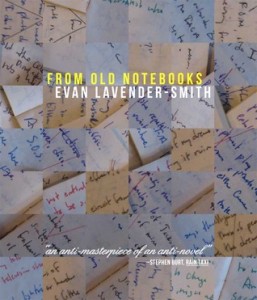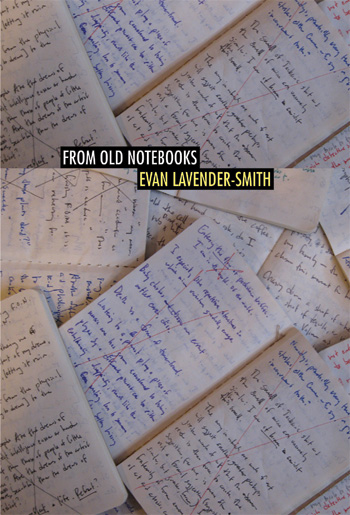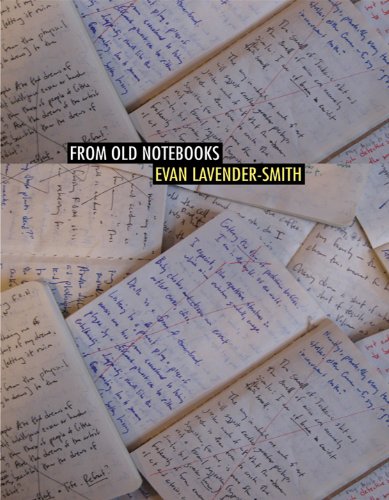From Old Notebooks by Evan Lavender-Smith
 From Old Notebooks
From Old Notebooks
by Evan Lavender-Smith
Dzanc Books, December 2012
182 pages / $15 Buy from Dzanc Books
Martin Heidegger posited the idea that all criticism is existential and there is no impartial analysis outside of the experience of the reader. A reviewer of Evan Lavender-Smith’s From Old Notebooks asks: “Should the reader of F.O.N. expect the meaning or truth of the book to lie with its author? Does the truth/meaning of the book lie outside the book?” Furthermore: “There may be some question as to F.O.N.’s status as fiction, poetry, philosophy, nonfiction, etc. but hopefully there will be no question about its status as a book.” Both comments are from Evan Lavender-Smith critiquing his own book within the pages of From Old Notebooks, even revealing: “Why am I so averse to the idea of classifying F.O.N. as poetry? – Because poetry doesn’t sell.” That’s the way From Old Notebooks rolls, defying genre and classification, even defying the traditional boundaries of author and reader. On the exterior, it reads like a notebook filled with philosophical musings, hermeneutics, the germs of story ideas, dialectical exposition, hagiographies on dubious beliefs, aphorisms made ironic by their sincerity, and letters to death. But the flow of the notebooks is deceptively simple, appearing like a random collection of ideas when it’s in fact a journey through the Penrose stairs of Smith’s mind.
I came across From Old Notebooks several years ago when it was first published by BlazeVOX. F.O.N. was one of the first postmodern/experimental works I’d read. Since then, I’ve read a lot more experimental works, some of my recent favorites including Robert Kloss’s The Alligators of Abraham; One by Blake Butler, Vanessa Place, and Chris Higgs; and Janice Lee’s Daughter. With F.O.N. recently reissued by Dzanc Books, I was excited about diving back in. It’s hard to analyze experimental works because the experience the reader has is so subjective and without making assumptions about the author’s intent, a huge part of the critique, for me, comes down to how the work resonates on a personal level. Explorations of infinity and thought stripped away from form involve literary techniques that are invented along the path of creation, and as a result, often defy formulaic definition. That is what makes these works so bold and compelling. Part of the allure of From Old Notebooks, then, is its accessibility.
The subject matter and the themes vary, encompassing everything from film quirks to quandaries on death, musings on poetry, and pornographic abstinence. The notes incorporate personal whimsies, fears, and even worries about family. Rather than obfuscate, we have a movement toward revelation. But the investigation branches into even more questions and there’s a playfulness in the tone that engenders the feeling of a contemporized Socratic enquiry, only with oneself. As a few examples:
“God endowed the universe with an infinite number of signs, but only one fact.”
“Qualifying death as “unknowable” is, finally, an act of cowardice; death as “unknowable” preserves mystery, the possibility of mystery. The truth atheist knows death intimately; for him, there is nothing at all mysterious about death.”
“Perhaps they would be more palatable if independent films had more explosions in them.”
“Should I be concerned about exploiting my children by including them in F.O.N.?”
“Consciousness is my worst habit.”
June 10th, 2013 / 11:00 am
Writers Respond: An Interview with Evan Lavender-Smith
 Evan Lavender-Smith is a smart guy. Evan Lavender-Smith is, like, way too smart for me. I haven’t read Heidegger. Haven’t read Markson. Missed most of the allusions, probably. And still had fun reading From Old Notebooks. Probably everyone should read it. Everyone is reading it. All the cool people have already read it. And soon they’ll be reading Avatar, which is due out in 2011. People will be like: Q: Who’s this Evan Lavender-Smith dude wrote these asskickers? Everyone else will be all: A: Editor-in-chief of Noemi Press. Prose and drama editor of Puerto del Sol. And visiting assistant professor of English at New Mexico State University. Has awesome words in Fence, Glimmer Train, Colorado Review, Denver Quarterly, etc. And a website. www.el-s.net. You should visit it and read this interview, which was conducted using Google Docs from September 28, 2010 – October 19, 2010.
Evan Lavender-Smith is a smart guy. Evan Lavender-Smith is, like, way too smart for me. I haven’t read Heidegger. Haven’t read Markson. Missed most of the allusions, probably. And still had fun reading From Old Notebooks. Probably everyone should read it. Everyone is reading it. All the cool people have already read it. And soon they’ll be reading Avatar, which is due out in 2011. People will be like: Q: Who’s this Evan Lavender-Smith dude wrote these asskickers? Everyone else will be all: A: Editor-in-chief of Noemi Press. Prose and drama editor of Puerto del Sol. And visiting assistant professor of English at New Mexico State University. Has awesome words in Fence, Glimmer Train, Colorado Review, Denver Quarterly, etc. And a website. www.el-s.net. You should visit it and read this interview, which was conducted using Google Docs from September 28, 2010 – October 19, 2010.
1.
From Old Notebooks: How do we read it?
MOLLY GAUDRY: I’m interested in how the opening notes in From Old Notebooks (F.O.N.) help instruct the reader as to how to read this book and also sort of explain, without explanation, what this book is. READ MORE >
December 3rd, 2010 / 6:32 pm
Win Evan Lavender-Smith’s From Old Notebooks
 As Chris Higgs discussed a while back, ELS’s recent hybrid memoir-philosophic mania-idea machine-joke book-power assemblage From Old Notebooks is simply out of control. In the vein of Markson or D’Agata, but with a manic, hilarious, intense vision that makes it so singular it’s almost its own genre, this is the kind of machine you could keep returning to at any point inside it, any line as much its own as it is a contribution to same insane whole.
As Chris Higgs discussed a while back, ELS’s recent hybrid memoir-philosophic mania-idea machine-joke book-power assemblage From Old Notebooks is simply out of control. In the vein of Markson or D’Agata, but with a manic, hilarious, intense vision that makes it so singular it’s almost its own genre, this is the kind of machine you could keep returning to at any point inside it, any line as much its own as it is a contribution to same insane whole.
Here’s a line at random: “What if God had said to Phil Mickelson, Would you rather shit your pants or shoot a double bogey on the 18th hole in the U.S. Open?”
I have an extra copy of FON to giveaway to the commenter who tells the most compelling something he or she should probably keep hidden. Winner will be selected Saturday morning.
Excerpt reading and purchase here.
Some Thoughts on Evan Lavender-Smith’s From Old Notebooks

“The book is the subject and the object of the book.” (pg. 137)
“In a certain respect, [From Old Notebooks] represents little more than the garbage can of my imagination.” (pg. 75)
One afternoon I checked my facebook page and saw in the news feed thing a post by Evan Lavender-Smith, which included blurbs for his book From Old Notebooks. What struck me about the post was that instead of the blurbs being from other “creative” writers, they were from literary critics, and not just any literary critics, but some of the biggest names in Deleuze Studies: Claire Colebrook and Ian Buchanan, to name only two. Knowing nothing else about it, I automatically wanted to purchase the book and read it.
What follows are some thoughts, having finished it last night.
!!!
The brilliant Noah Cicero and the brilliant Evan Lavender-Smith both have new books out. Check out (the long awaited) The Insurgent and (the massively praised) From Old Notebooks.
!!!
